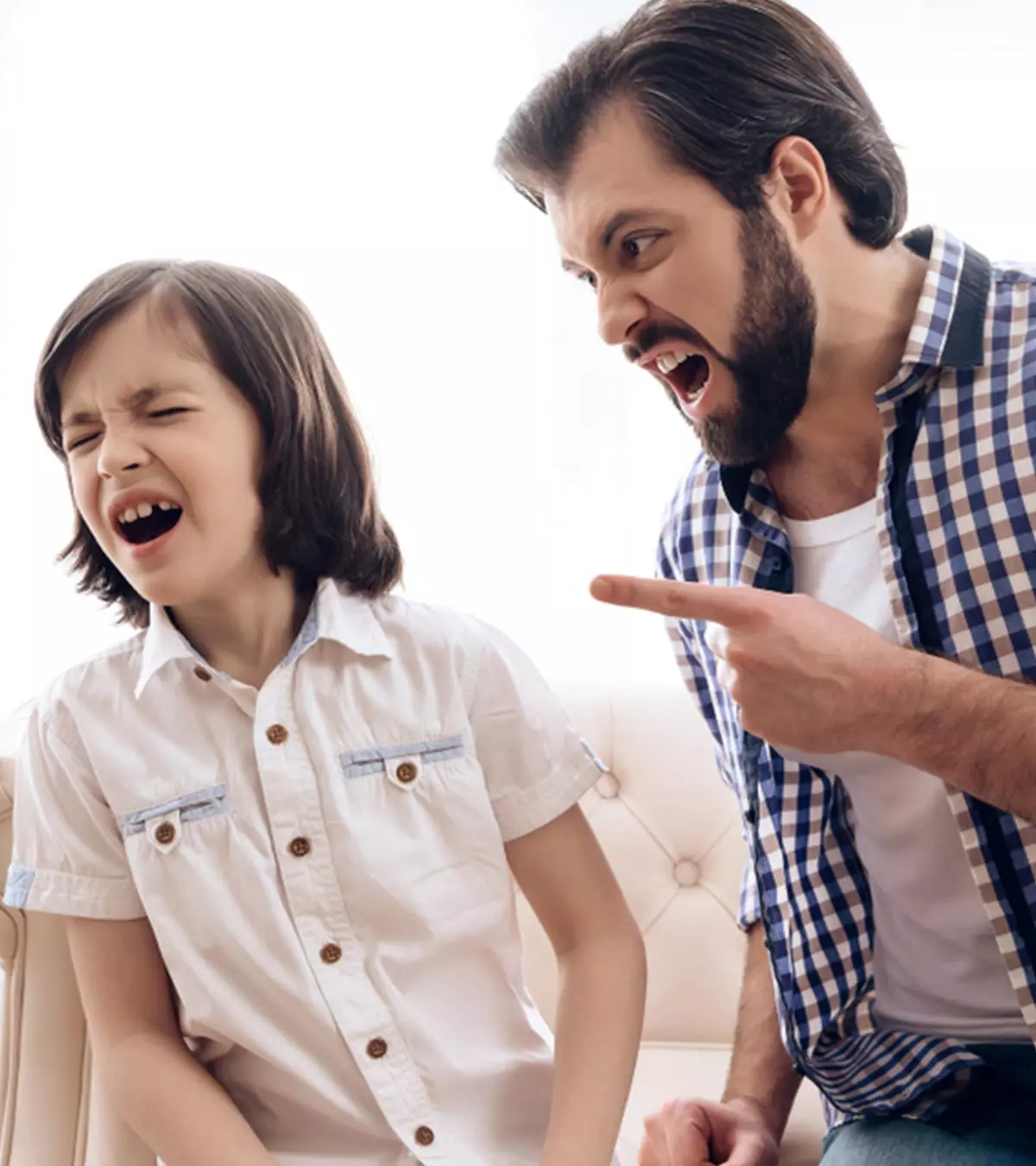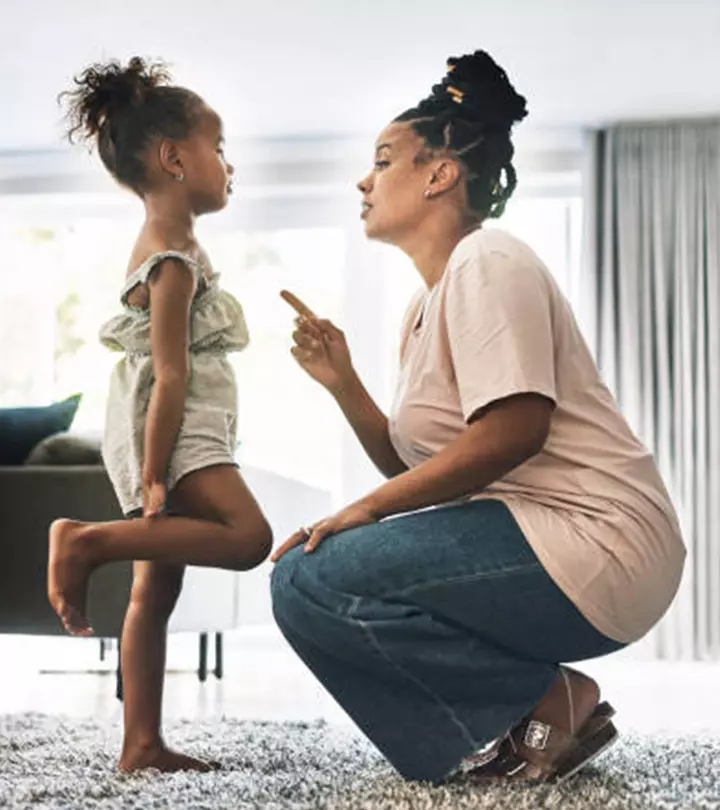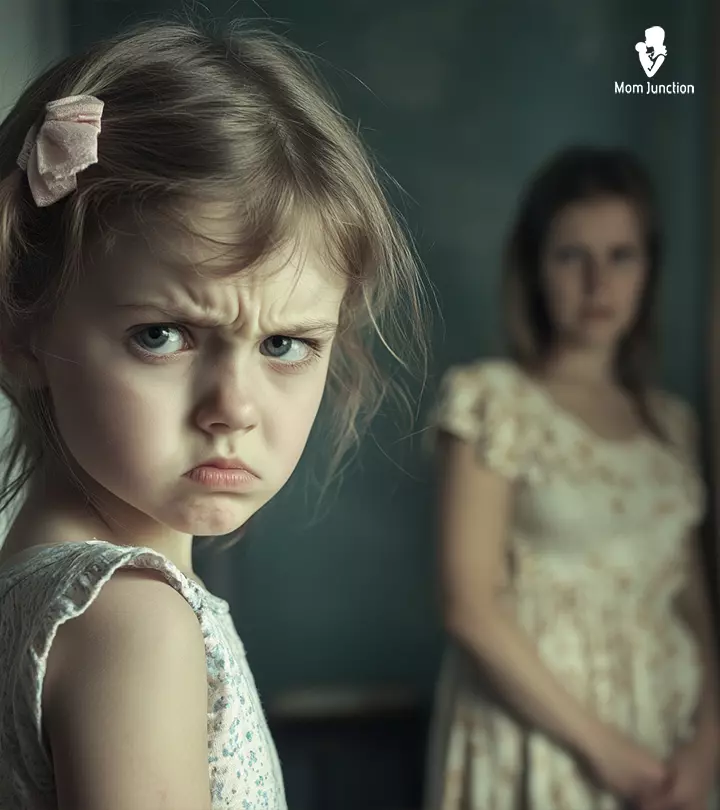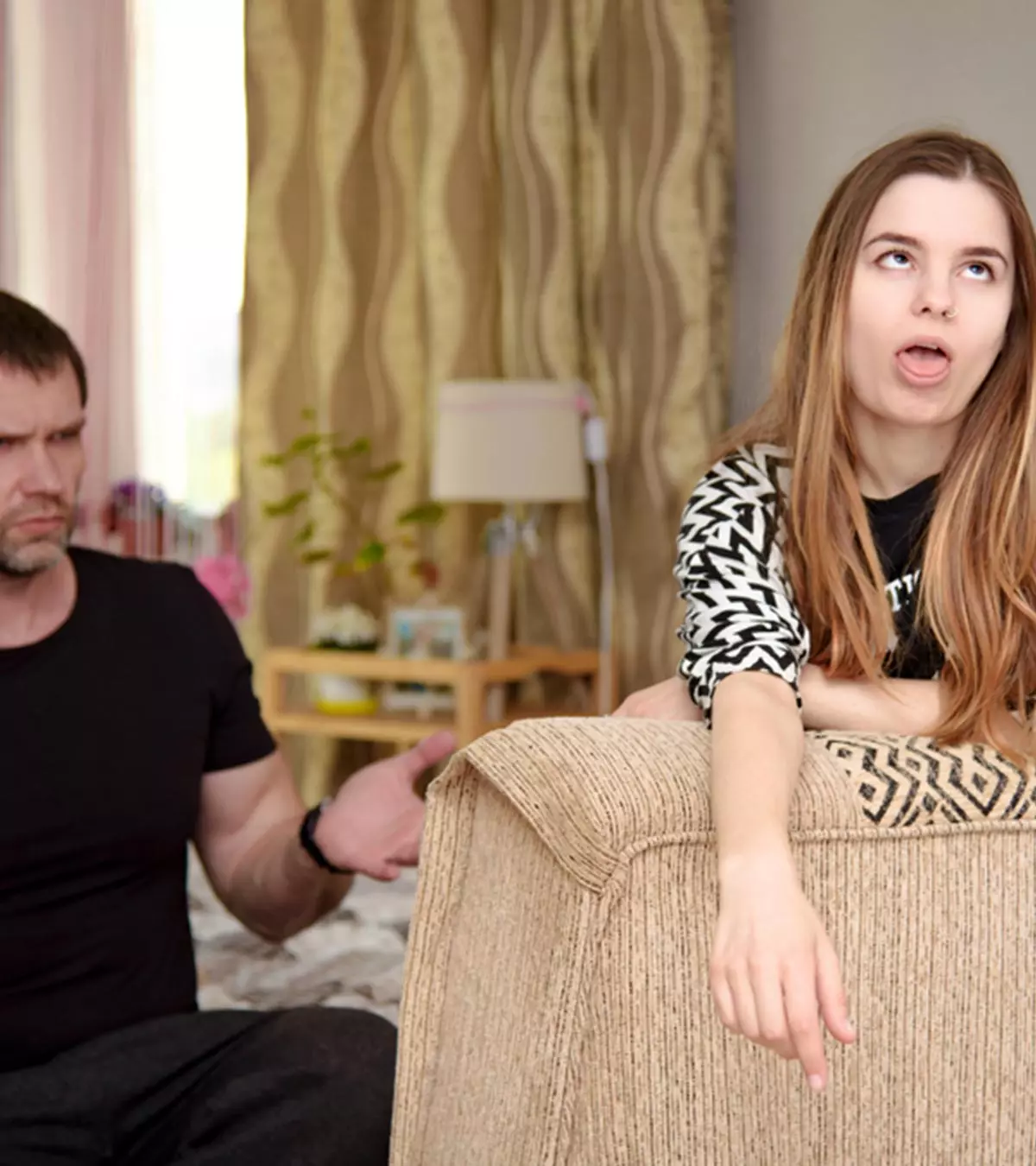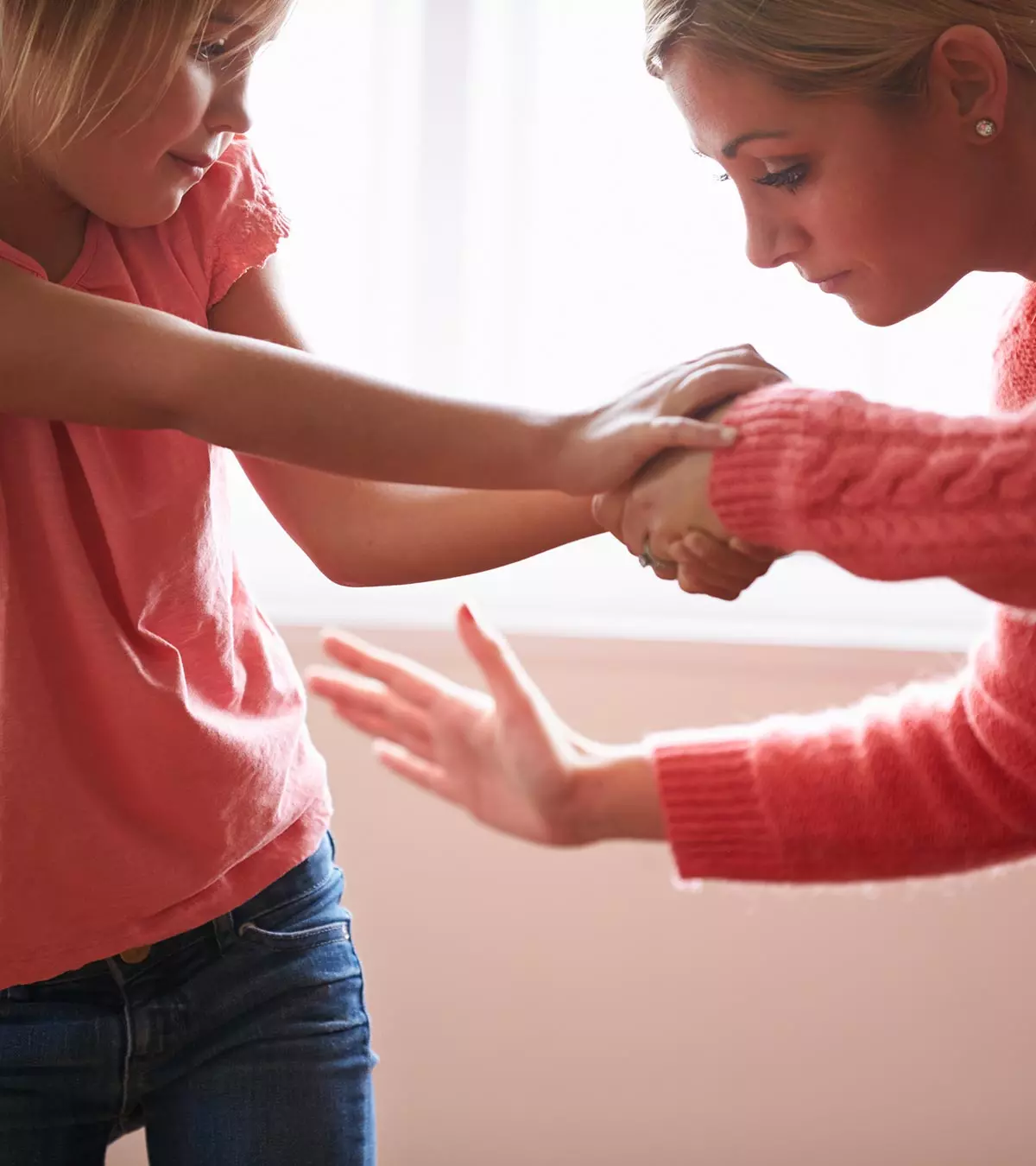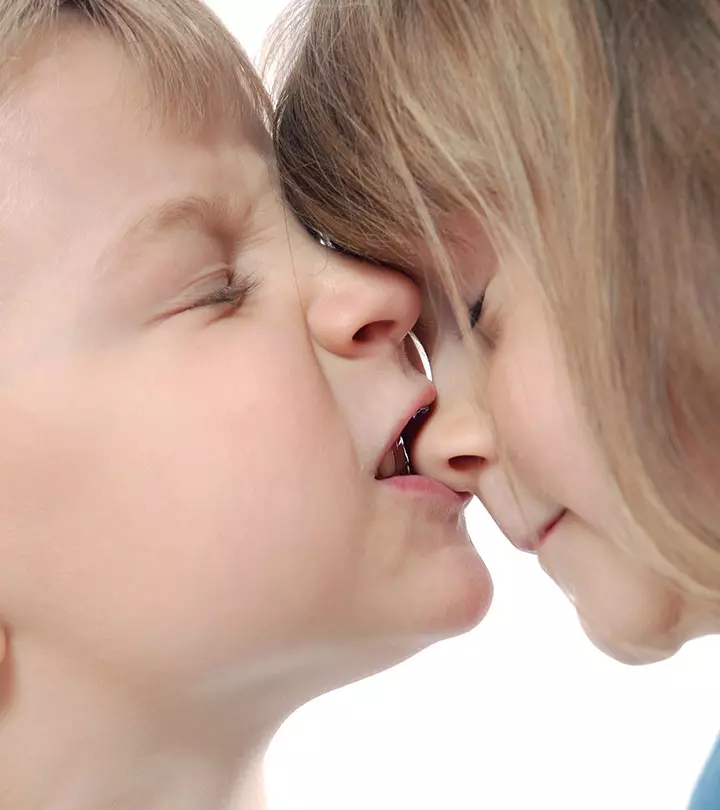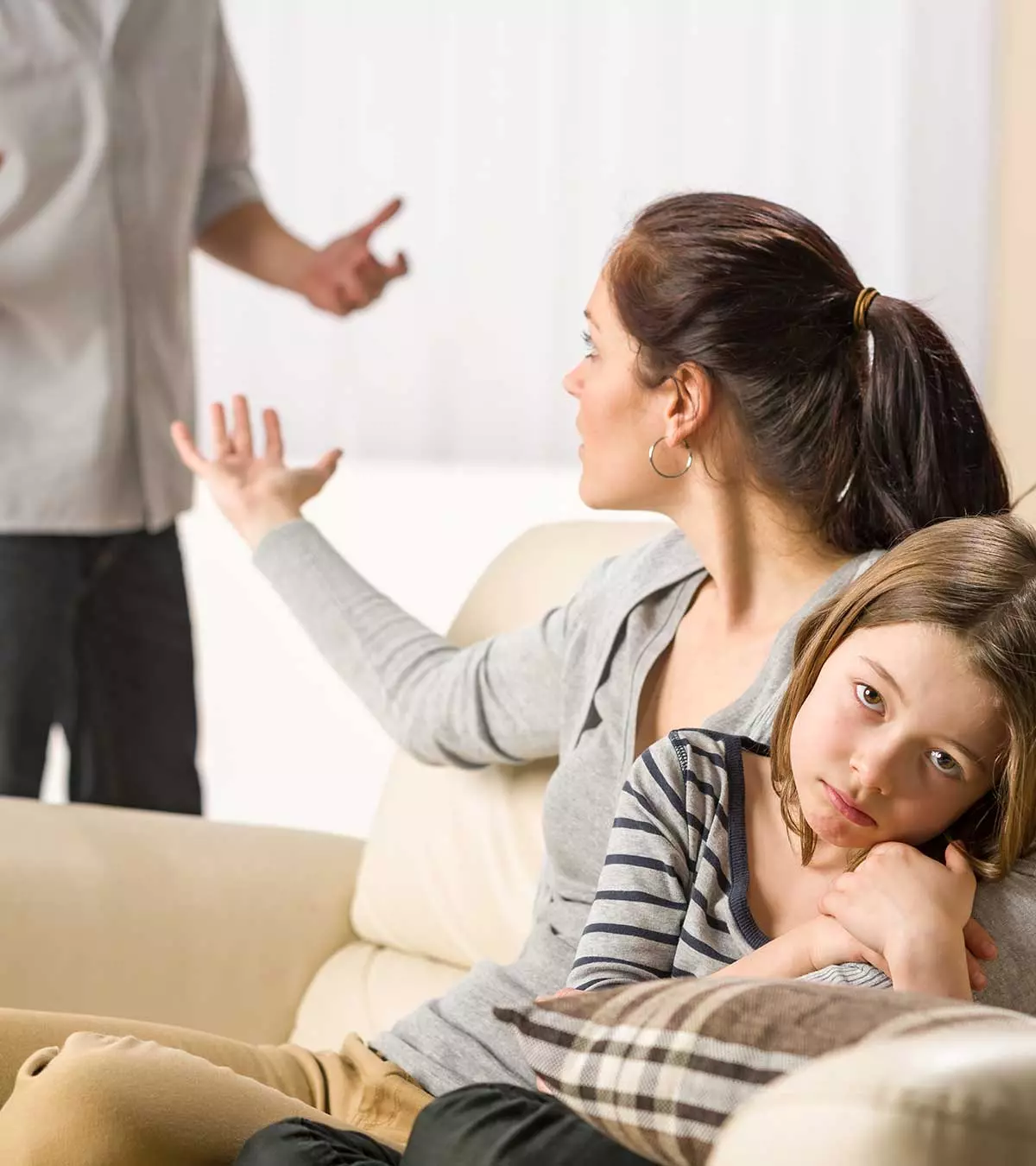
Image: ShutterStock
The effects of verbal abuse on children can be more serious than you think, and it is one of the most overlooked forms of child abuse. Verbal abuse includes behaviors such as swearing, yelling, blaming, shaming, ridiculing, demeaning, criticizing, and threatening, which can create a toxic environment for children (1). It is often falsely represented as a form of “tough love” or “disciplining.” However, there can be long-term and short-term consequences. Children may feel humiliated, ashamed, or unloved and may not express it. They may also hesitate to communicate with their parents, who verbally abuse them. According to the Centers for Disease Control and Prevention, in 2025, at least one in seven children experienced child abuse or neglect in the United States. Threatening or yelling at children can negatively impact their mental health eventually. Read on to know the side effects of verbal abuse in children and some positive parental strategies.

Key Pointers
- Children who experience verbal abuse frequently suffer from depression, poor physical and mental performance, and the onset of inferiority complexes.
- Verbal abuse can lead to long-term health problems, including disrupted eating patterns and poor growth.
- Parents often misinterpret abusive language as “tough love” or “disciplining” among children.
- Positive parenting techniques can reduce the harm that verbal abuse has on children.
Short-Term Effects Of Verbal Abuse On Children
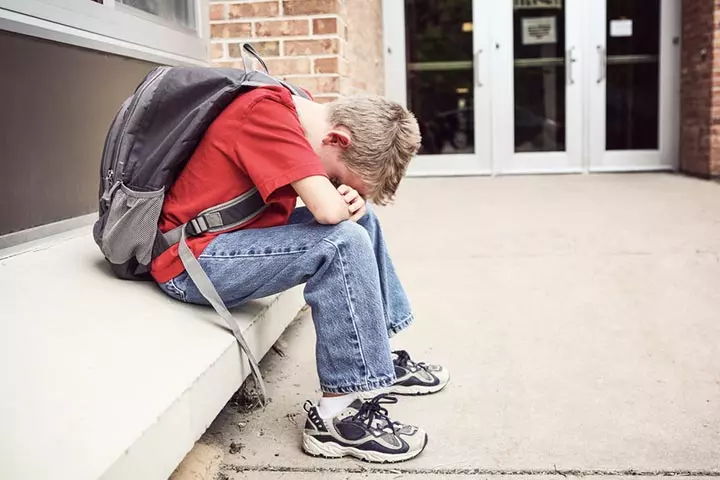
While the damages caused by verbal abuse cannot be seen externally, it leaves behind a psychological trauma that often makes it difficult for the child to get over. The short-term psychological effects of yelling at a child are described below (2) (3) (4):
1. Routine or clinical depression
Demoralizing or yelling at children can result in negative outcomes, potentially affecting their mental health.
- The child may develop inferiority complexes and may keep himself aloof from others.
- Verbal abuse and aggression can raise a child’s risk of developing mental health issues like depression and dissociative disorders (1). According to the American Psychological Association, parental verbal abuse is strongly associated with increased levels of dissociation, depression, and aggression in children and young adults (18).
- These conditions may become permanent, that is, clinical, if the abuse is allowed to happen frequently and for a long term.
 Did you know?
Did you know?2. Deteriorating mental and physical performances
With lower self confidence, the child may exhibit poor mental and physical performances (5) (6).
- If a parent for instance says, “I know you will win the race”, the child will automatically start assuming that he has won the race and he will have no doubts in his mind, irrespective of what the outcome may be.
- On the other hand, if you tell your child “you just don’t have the stamina”, he will get nervous about the poor outcome predicted for him. The child at this point may decide to lose to prove that his parents are right.
 Quick fact
Quick fact3. Develop inferiority complexes
When a child is yelled at constantly, he starts believing “there must be something wrong with me”.
- He starts developing inferiority complexes and feels his friends to be superior to him (5).
- Since he has been suggested that is not at par with others, he starts assuming others to be better than him and this in turn makes him abusive as well.
According to California-based clinical psychologist, Dr. Deborah Vinall, “Verbal abuse is innately traumatizing, particularly when chronic and unrestrained. The effects on the developing psyche are even more profound than that of physical abuse, as the child’s very sense of self is assaulted.”
4. Aggressive behavior
Verbal abuse may affect a child’s ability to form healthy emotional attachments, preventing them from developing the ability to resolve conflicts. This can put them at a higher risk for problems with their peers all through their childhood and even during their adulthood (5) (6) (7).
- Children with a verbally abusive parent are more likely to become physically and verbally aggressive.
- Studies indicate that a child who has experienced both physical abuse and verbal aggression has a higher likelihood of experiencing delinquency, interpersonal problems, and aggression.
Recalling the lasting impact of her mother’s verbal abuse on her mental health and self-worth, blogger Krista Mollion says, “My mom was a yeller and cusser. She also told me I ruined her life and she’d never wanted children. Luckily, I lived with my grandparents, who were kind and saved me (sometimes) from my mom’s outrages. But it deeply damaged my self-esteem and my self-worth.
“I developed social problems at school, despite being super intelligent. I felt unworthy of love. I was ‘bad.’ I became depressed. I rebelled. Eventually, I was sent to shelters, juvenile delinquent centers, and foster care before finally leaving for Africa with my dad. Not a great childhood (i).”
5. Clinginess
A child who has undergone shunning, harsh criticism, and verbal aggression may become excessively clingy as a means to see parental attention and acceptance (8) (9) (5).
- The child may become unusually compliant or passive.
- Repeated abuse over time can cause them to develop signs of dependent personality disorder.
- They may experience discomfort when making decisions, volunteering for tasks, offering nurturance to others, and expressing disagreements out of fear of losing the relationship.
Long Term Effects Of Verbal Abuse On Children
Children who have been subjected to constant verbal abuse suffer from permanent health and psychological disorders. According to the Centers for Disease Control and Prevention data from 2016-19, US children aged 3-17 years are most diagnosed with depression (4.4%), behavioral problems (8.9%), ADHD (9.8%), and anxiety (9.4%).
Here, we discuss some problems that can be caused as a result of verbal abuse.
1. Health issues

Depression leads to “substitution chain”, in which the victim, to satisfy his pleasures, tends to indulge in overeating or stop eating altogether leading to eating disorders. This affects his growth and development of bones, muscles and vital organs are also impaired. The child, thus, gets weaker and weaker with time which may cause a developmental delay.
As shown in the graph, hospitalization of children due to abuse and neglect in the US increased significantly in 2025 when compared to 2019. The Covid-19 pandemic made the situation worse as people were forced to stay indoors due to lockdowns.

Hospitalization due to child abuse and neglect in the US
Source: Morbidity and Mortality Weekly Report, CDC Quick fact
Quick fact2. Low self-confidence
Qualities of dominance and confidence are vital for a successful professional life and a satisfying personal life for adults. A confident child, for example, is more likely to join class discussions, make friends, and lead teams successfully in the future. On the other hand, low self-esteem can lead to frustration, depression, social withdrawal, or struggles in overcoming challenges (2).
3. Low hope in life
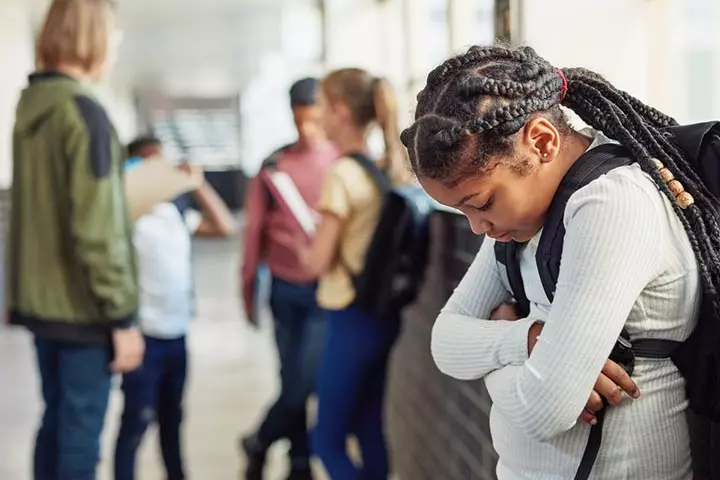
Victims subjected to constant verbal abuse may fail to develop a positive outlook and show poor self-confidence, which might cause problems in their later stages of life (2). For example, a child constantly criticized by their parents may begin to lose hope for their future, finding it hard to believe they can achieve their dreams.
4. Become addictive
The drive to accomplish a goal often keeps us away from alcohol or drugs (3). Again, if you look at the simple fact, the hungry will look for food while the depressed will look for addictive substances or other coping strategies to keep themselves away from reality.
5. Develop antisocial tendencies
The worst side effect is that abused children often grow up to be damaged adults and abused parents as well. Several studies on criminals’ childhood have established links between verbal abuse and the individual’s criminal history. Additionally, the after-effects of abuse may also include guilt, post-traumatic stress, and a tendency to self-harm (2). Different cultures view and handle verbal abuse in different ways. In some communities, it may be seen as normal, making it harder for victims to get help.
Erika Bocknek, Licensed Marriage and Family Therapist (LMFT) from the Detroit Metropolitan Area, Michigan, opines, “Often children who were verbally abused by their own parents are at risk of repeating this cycle and experience challenges in other interpersonal relationships. Corrective experiences in relationships with loving and empathetic supplemental caregivers and later, peers and partners provide important opportunities for healing.”
Emotional Child Abuse Vs. Verbal Child Abuse
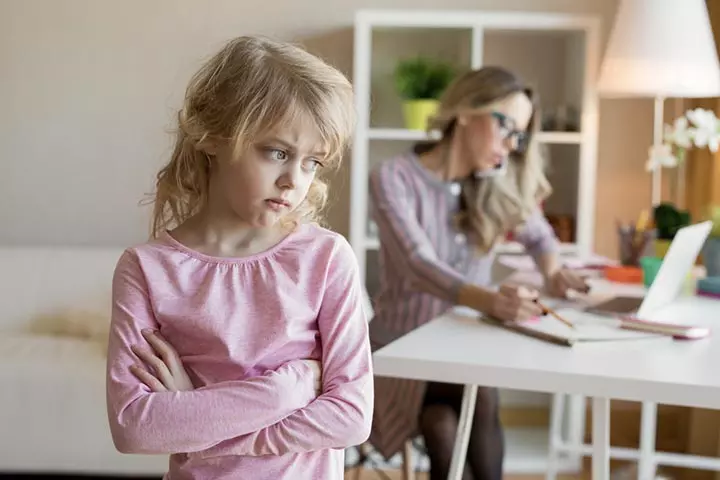
Sometimes verbal abuse can also be emotional abuse. In many cases, emotional child abuse is a form of constant emotional maltreatment or neglect that your child feels subjected to, either by you or someone else close to him. Emotional or psychological abuse can cause some very serious damage to your child’s cognitive, emotional, social, and psychological development (10). Sometimes, the parent or the caregiver will emotionally abuse the child knowing very well what the consequences can be. At other times, parents or caregivers can subject the child to emotional abuse without realizing what they are doing.
Here are a few situations that can make your child suffer from emotional abuse:
1. Ignoring your child
- You may be ignoring your child when you, or the main caregiver, are not present with him most of the time, to such an extent that he starts feeling lonely.
- Also, in some situations, you may be physically present with your child, but may not be paying any attention to him.
- Other situations in which your child may feel ignored are if you avoid making eye contact while speaking to him or do not frequently address him by name.
2. Rejecting your child’s needs
- Rejecting your child’s needs could mean something as simple as ridiculing your child in front of others, which could seem a small incident to you at the time, but can have a grave and long-lasting consequence.
- You may regularly refuse to respond to your child’s simple physical needs by not touching or hugging him. You may also be rejecting his basic needs and wants.
3. Keeping your child in isolation
- Keeping your child in isolation means that you regularly prevent your child from being in touch with his friends or peers. This is known as social isolation and it could also mean a situation where you prevent your child from having regular social interactions with other family members or adults.
- Keeping your child in isolation will also refer to those times when you may choose to limit your child’s freedom of movement, often in the way of keeping him grounded as a punishment. While many parents do punish their child by confining them, it can become a form of emotional abuse for the child if it is too frequent.
4. Exploiting or corrupting the child by manipulating them
- If your child is suffering from the exploitative or corrupt form of emotional abuse, someone may be teaching or encouraging him to take part in activities that are inappropriate or even illegal.
- In some cases, your child may also be forced into the same, sometimes without your knowledge.
- Exploitative or corrupt forms of emotional abuse could involve behavior from the parent or the main caregiver that is antisocial or self-destructive. It could encourage risky behavior in the child by forcing him to lie or steal or get involved in flesh trade.
5. Verbal assault and abuse
- The verbal form of emotional abuse of a child can also have a very strong and long-lasting effect on him.
- A verbal assault could involve ridiculing, shaming, belittling the child on a regular basis. It could also involve a situation in which someone verbally threatens your child.
6. Terrorizing the child
- When a child feels terrorized as a form of emotional abuse, it means that the parent or caregiver threatens or bullies the child to make him obey.
- A parent or a caregiver can threaten or bully the child in various ways. It could be an act that puts the child in a dangerous or uncomfortable situation. It could also be an act of separating him from his favorite pet or toy or even a sibling until he complies.
- In many cases, the child can feel terrorized or bullied when the parent or caregiver puts unrealistic expectations in front of him. He may fear dangerous consequences if he does not meet the expectations.
A Few Facts On Emotional Abuse In Children
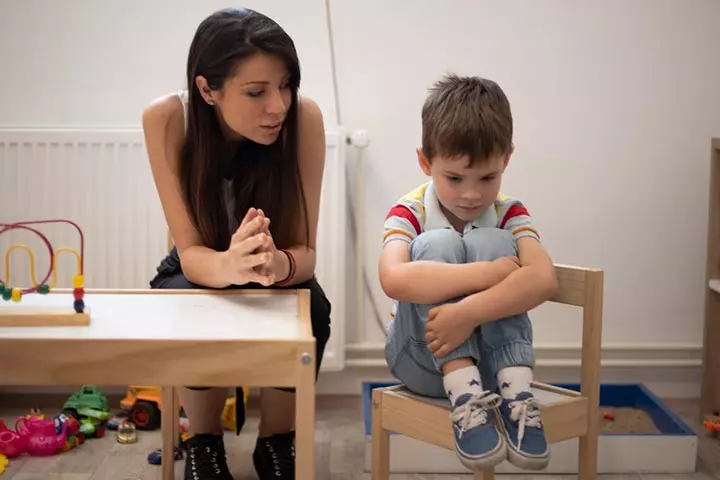
Here are a few shocking facts about emotional abuse in children:
- Almost 90 percent of all child deaths are a result of instigation by family members or close associates.
- Children who are victims of abuse have a 25 percent higher risk of suffering from various health and mental issues.
- Children who suffer from emotional abuse are prone to- teen pregnancy, delinquent behavior, dropping out of school, and substance abuse.
Tips To Prevent Emotional Abuse
As a parent or caregiver, it may be true that you love your child or ward, but it can also be true that you do end up making him suffer from emotional abuse unknowingly. It is true that even model parents yell at their children or ignore them sometimes. When such instances happen as a one-off behavior, it is not abusive in any way. However, the risk of emotional abuse starts to emerge when this type of behavior turns into a regular habit.
Dana M. Manzo, licensed psychotherapist from Florida, suggests, “It’s important for parents to find healthy ways to communicate with their children, such as using calm and respectful language, active listening, and positive reinforcement. If shouting or other forms of emotional abuse are a regular occurrence in the household, seeking the guidance of a mental health professional may be beneficial.”
While emotional abuse to a child can happen in any family with any background, there are some situations that can trigger it. Here are some situations that could increase the risk of emotional abuse (11) (12):
- A family that is going through financial difficulties will find it difficult to take care of the child’s academic as well as other basic needs. A child in such a family is likely to face emotional abuse (13).
- A single parent may feel unduly burdened with all the care and responsibility of the child. He may vent his frustration on the child and thereby emotionally abuse him.
- A child is also at a higher risk of being subjected to emotional abuse in case there is a separation or divorce in the family. In such a situation, both the parents may be busy with the proceedings and may emotionally neglect the child.
Here are a few ways to prevent emotional abuse and foster a healthy, supportive environment for children (11) (12):
- Encourage open communication: Create an environment where your child feels comfortable sharing their thoughts and feelings without fear of judgment.
- Help the child overcome challenges: Learn about and address any problems your child may have without labeling or belittling them, and focus on building their confidence.
- Set healthy boundaries: Provide guidance through clear, kind rules. Discipline should be fair, not harsh or punitive.
- Be a positive role model: Demonstrate calm and respectful behavior, as children often mirror their parents’ actions.
- Nurture your bond: Spend quality time with your child through shared activities, offering unconditional love and support.
- Seek professional help: If you’re feeling overwhelmed, don’t hesitate to reach out to a counselor or community group for support.
Frequently Asked Questions
1. How does verbal abuse affect the brain of children?
When children are subjected to verbal abuse, particularly from their parents, changes in brain structure have been discovered. The study found that parental verbal aggression during childhood may affect the development of the auditory association cortex, which is involved in language processing. Such children are more likely to experience severe psychiatric consequences, such as mood and anxiety disorders (14).
2. How do I deal with verbally abusive parents?
It can be challenging to recognize that you are being verbally or emotionally abused as a child, and even after you do, it can be challenging to fight back. In such cases, try to remain calm at the moment because talking or screaming back can aggravate the situation; identify the pattern of their behavior and leave immediately; seek advice from other older people or professionals; and try to express your emotions to your parents when they are calm and spend time with them (15) (16).
3. What do abusive parents act like?
Abusive parents are mostly toxic and have self-centered behavior; they can be seen yelling, screaming, or name-calling their children; they always blame their children, are manipulative, and force their children to do what they want; they are always in their children’s way and are unable to respect boundaries; emotionally abusive parents can also be seen physically abusing their children (16).
4. What are the signs of narcissistic abuse?
Jephtha Tausig, New York-based licensed clinical psychologist, says, “Narcissistic Abuse can cause depression and anxiety, shame, hypervigilance and feelings of worthlessness and hopelessness.”
5. How can recovery from verbal abuse be supported?
Recovery from verbal abuse requires an approach focused on healing psychological wounds and rebuilding self-worth. If you know a child experiencing verbal abuse, you help them seek professional counseling or therapy, connect them with support groups, and teach them self-care practices. Additionally, help them identify and manage internalized negative thoughts. Furthermore, there are government resources in the US, such as the Childhelp National Child Abuse Hotline and State Child Abuse and Neglect Reporting Numbers, where incidents can be reported and support can be accessed (19).
Abuse of any kind can have long-lasting negative impacts on a child. Some are visible, while others are not. And verbal abuse is quite difficult to recognize. Therefore it is essential to stay alert and aware of the signs and effects of verbal abuse on children to get the help they need. If any child you know is suffering from verbal abuse, reach out to them and get the support they require. Help them understand that they do not need to put up with such hurtful talks and stress and raise their voice against painful remarks. During this time you may also provide them with extra love and care to support them emotionally.
Infographic: Effects Of Verbal Abuse On Children
Verbal abuse is a form of emotional abuse that can adversely affect children’s mental and physical health. Thus, its prompt identification and reporting are essential to save the child from undue mental trauma. Read this infographic to know the potential signs of verbal abuse, which could help determine if a child is facing verbal abuse.
Some thing wrong with infographic shortcode. please verify shortcode syntax
Illustration: Serious Negative Effects Of Verbal Abuse On Children
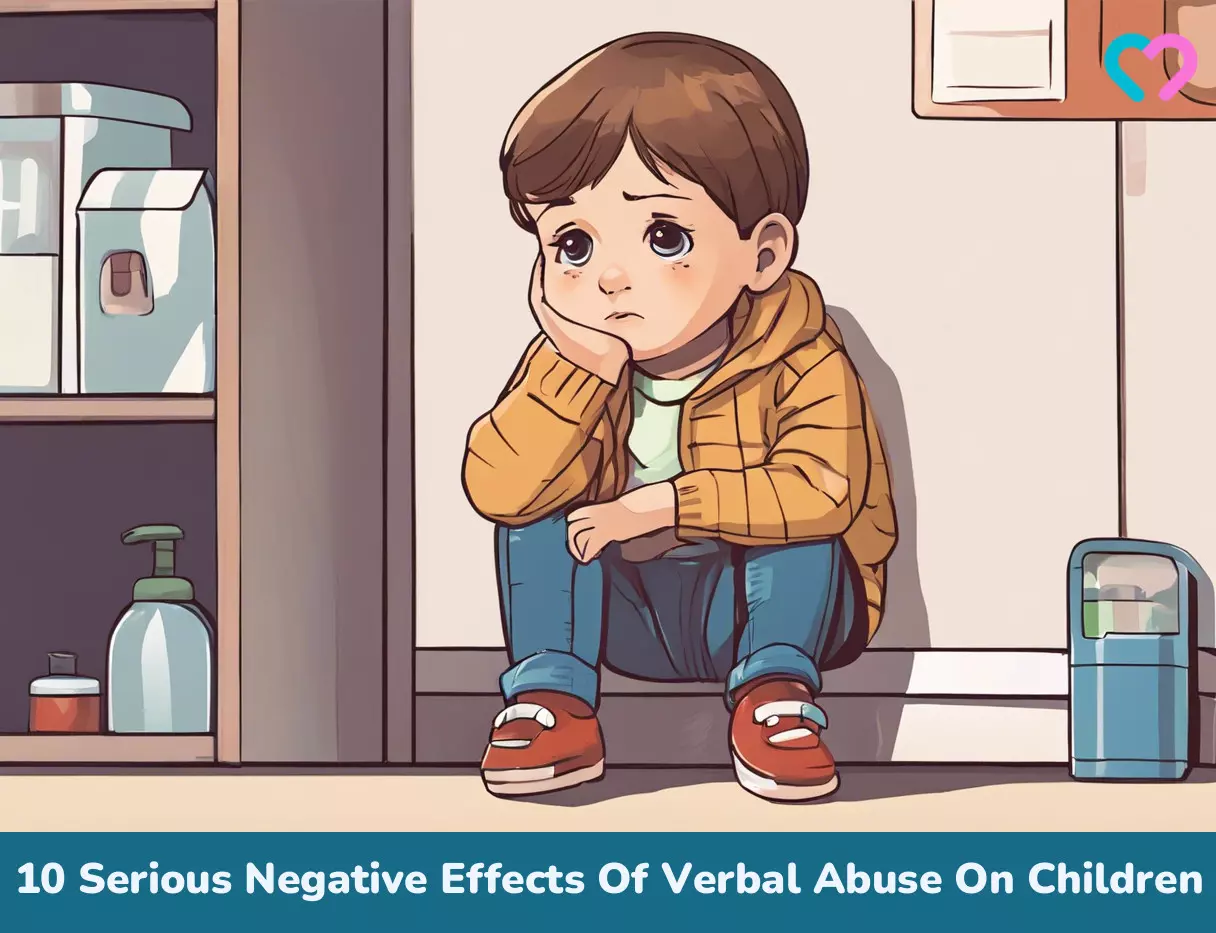
Image: Stable Diffusion/MomJunction Design Team
Gain awareness of the indicators of psychological abuse in children and understand the potential repercussions by watching this informative video.
Personal Experience: Source
MomJunction articles include first-hand experiences to provide you with better insights through real-life narratives. Here are the sources of personal accounts referenced in this article.
i. Verbal Abuse Is Child Abuse;https://kmollion.medium.com/to-all-parents-and-future-parents-please-give-me-five-minutes-of-your-time-a459144fba62
References
- Verbal beatings hurt as much as sexual abuse.
https://news.harvard.edu/gazette/story/2007/04/verbal-beatings-hurt-as-much-as-sexual-abuse/ - Verbal abuse.
https://www.researchgate.net/publication/291522391_Verbal_Abuse - Behavioral Indicators Of Abuse.
https://americanspcc.org/emotional-child-abuse/ - What Are The Effects Of Verbal Abuse On Children?.
https://www.ccpa-accp.ca/what-are-the-effects-of-verbal-abuse-on-children/ - Emotional Abuse: The Signs & Effects on Children.
https://www.youthranch.org/blog/understanding-emotional-child-abuse - MalidaTsani Fairuzza et al; (2025); The role of parental education on verbal abuse and its impact on the mental health of young adults.
https://www.redalyc.org/journal/582/58274534004/html/#:~:text=Emotional%20abuse%20in,on%20the%20victim%E2%80%99s - Y M Vissing et al; (1991); Verbal aggression by parents and psychosocial problems of children.
https://pubmed.ncbi.nlm.nih.gov/2043974/ - Child abuse.
https://www.berrystreet.org.au/learning-and-resources/fact-sheets/child-abuse - Dependent Personality Disorder.
https://my.clevelandclinic.org/health/diseases/9783-dependent-personality-disorder - Emotional abuse.
https://www.nspcc.org.uk/what-is-child-abuse/types-of-abuse/emotional-abuse/ - Protecting children from emotional abuse.
https://learning.nspcc.org.uk/child-abuse-and-neglect/emotional-abuse - Preventing Child Emotional Abuse.
http://preventchildabuse.org/images/docs/emotionalabusebrochure.final.pdf - Trends in U.S. Emergency Department Visits Related to Suspected or Confirmed Child Abuse and Neglect Among Children and Adolescents Aged
https://www.cdc.gov/mmwr/volumes/69/wr/mm6949a1.htm?s_cid=mm6949a1_w - Akemi Tomoda, et al.; (2010); Exposure to Parental Verbal Abuse is Associated with Increased Gray Matter Volume in Superior Temporal Gyrus.
https://www.ncbi.nlm.nih.gov/pmc/articles/PMC2950228// - 6 Ways To Deal With Emotionally Abusive Parents.
https://www.avensonline.org/blog/secure-your-smile-mastering-dental-implant-care.html - How to Tell if You Have a Toxic Parent.
https://health.clevelandclinic.org/toxic-parenting-traits - Lani Thomason; (2018); Childhood Verbal Abuse and its Psychological Effects on Adults
https://poliklinika-harni.hr/images/uploads/449/verbalno-zlostavljanje-psiholoski-razvitak.pdf - Unseen wounds.
https://www.apa.org/monitor/2015/07-08/ce-corner - How to Report Child Abuse and Neglect.
https://www.childwelfare.gov/how-report-child-abuse-and-neglect/
Community Experiences
Join the conversation and become a part of our nurturing community! Share your stories, experiences, and insights to connect with fellow parents.
Read full bio of Catherine Mok
- Dr. Jephtha Tausig is a New York City-based licensed clinical psychologist. She has over 20 years of experience working with children, teens, young adults, couples, and the elderly. Dr. Tausig did her MS in Clinical Psychology and PhD at Columbia University.
 Dr. Jephtha Tausig is a New York City-based licensed clinical psychologist. She has over 20 years of experience working with children, teens, young adults, couples, and the elderly. Dr. Tausig did her MS in Clinical Psychology and PhD at Columbia University.
Dr. Jephtha Tausig is a New York City-based licensed clinical psychologist. She has over 20 years of experience working with children, teens, young adults, couples, and the elderly. Dr. Tausig did her MS in Clinical Psychology and PhD at Columbia University. - Dana M. Manzo is a licensed psychotherapist and dean of campus wellness and student development at Beacon College in Leesburg, Florida. She also works in private practice Milestone Counseling in Clermont, Fla., where she consults on children’s issues and therapeutic issues including postpartum depression. Dana did her masters in Counseling Psychology at Palm Beach Atlantic University.
 Dana M. Manzo is a licensed psychotherapist and dean of campus wellness and student development at Beacon College in Leesburg, Florida. She also works in private practice Milestone Counseling in Clermont, Fla., where she consults on children’s issues and therapeutic issues including postpartum depression. Dana did her masters in Counseling Psychology at Palm Beach Atlantic University.
Dana M. Manzo is a licensed psychotherapist and dean of campus wellness and student development at Beacon College in Leesburg, Florida. She also works in private practice Milestone Counseling in Clermont, Fla., where she consults on children’s issues and therapeutic issues including postpartum depression. Dana did her masters in Counseling Psychology at Palm Beach Atlantic University. - Dr. Erika Bocknek is a university professor, specializing in family therapy. The mother of three holds a master's degree in Couples and Family Therapy, a doctorate in Child Development, and postdoctoral fellowships in Child Psychiatry and Infant Mental Health. Dr. Bocknek currently works as an associate editor for the Infant Mental Health Journal and has over 50 peer-reviewed research papers and book chapters to her credit.
 Dr. Erika Bocknek is a university professor, specializing in family therapy. The mother of three holds a master's degree in Couples and Family Therapy, a doctorate in Child Development, and postdoctoral fellowships in Child Psychiatry and Infant Mental Health. Dr. Bocknek currently works as an associate editor for the Infant Mental Health Journal and has over 50 peer-reviewed research papers and book chapters to her credit.
Dr. Erika Bocknek is a university professor, specializing in family therapy. The mother of three holds a master's degree in Couples and Family Therapy, a doctorate in Child Development, and postdoctoral fellowships in Child Psychiatry and Infant Mental Health. Dr. Bocknek currently works as an associate editor for the Infant Mental Health Journal and has over 50 peer-reviewed research papers and book chapters to her credit. 
Deborah Vinall is a Doctor of Psychology, a Licensed Marriage and Family Therapist, and a certified EMDR and Brainspotting practitioner, managing her private practice in Upland, CA. She specializes in addressing traumatic life experiences and painful relationships. Deborah is the author of Gaslighting: A Step-by-Step Recovery Guide and Trauma Recovery Workbook for Teens.
Deborah Vinall is a Doctor of Psychology, a Licensed Marriage and Family Therapist, and a certified EMDR and Brainspotting practitioner, managing her private practice in Upland, CA. She specializes in addressing traumatic life experiences and painful relationships. Deborah is the author of Gaslighting: A Step-by-Step Recovery Guide and Trauma Recovery Workbook for Teens.
Read full bio of Harshita Makvana
Read full bio of Swati Patwal
Read full bio of Apoorva K






